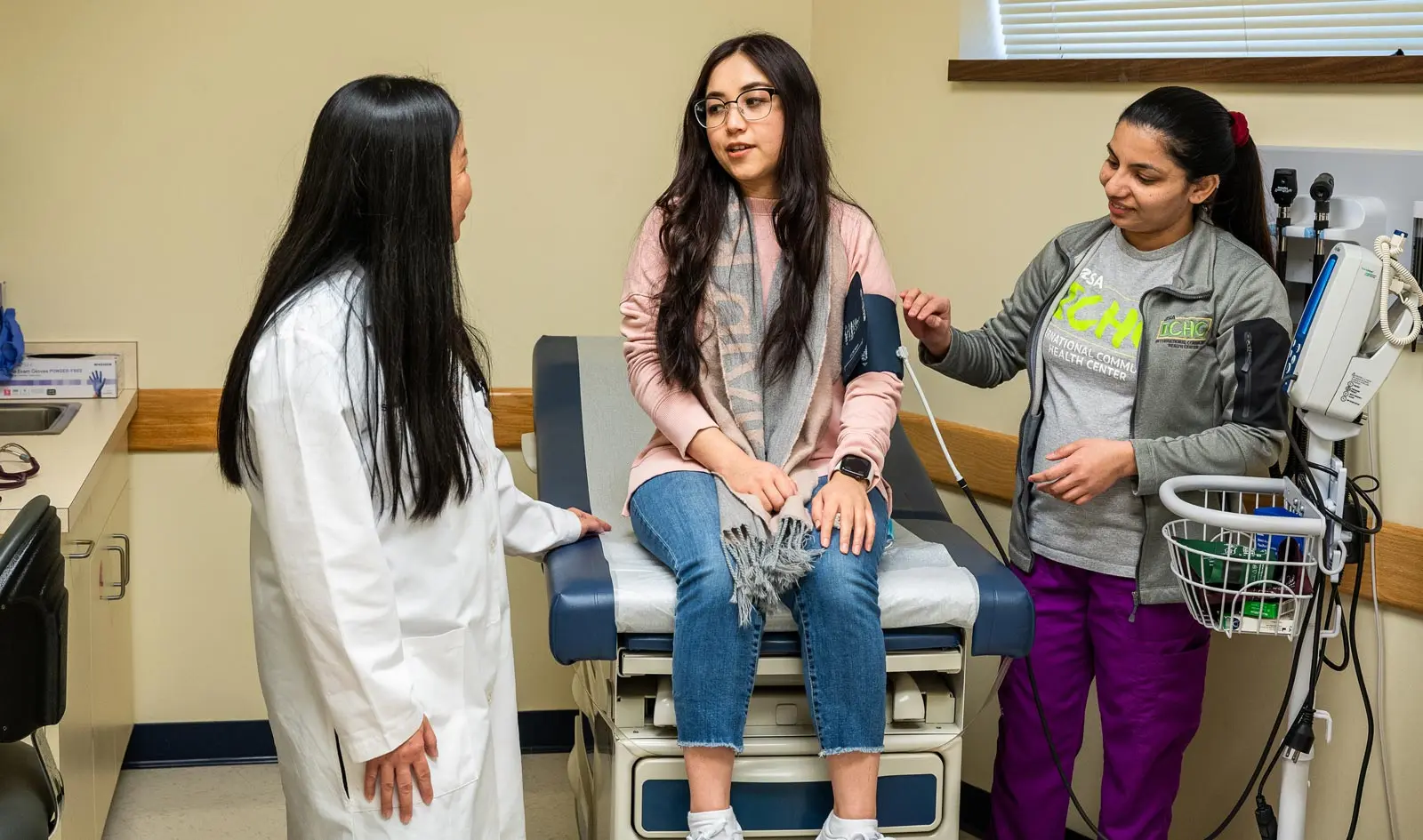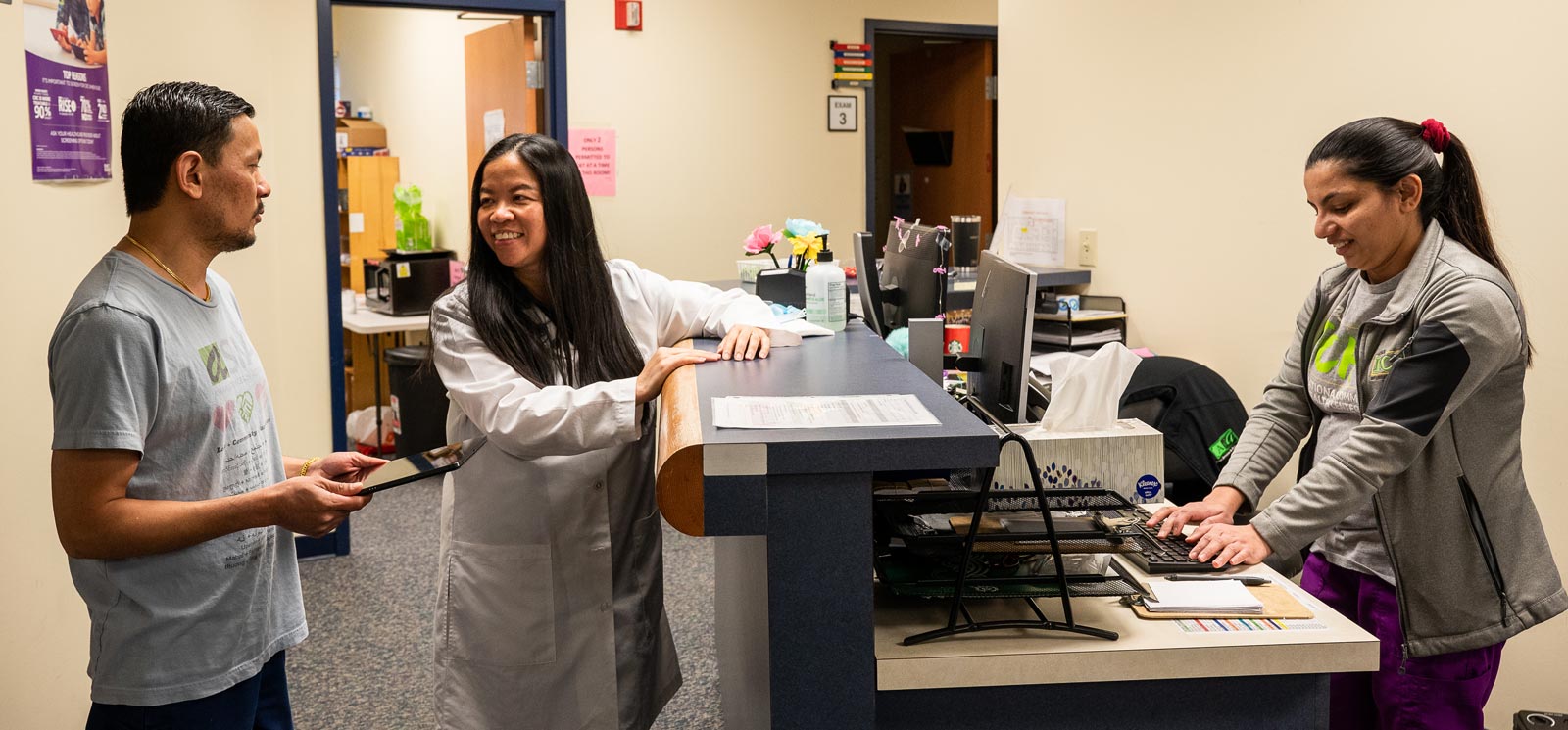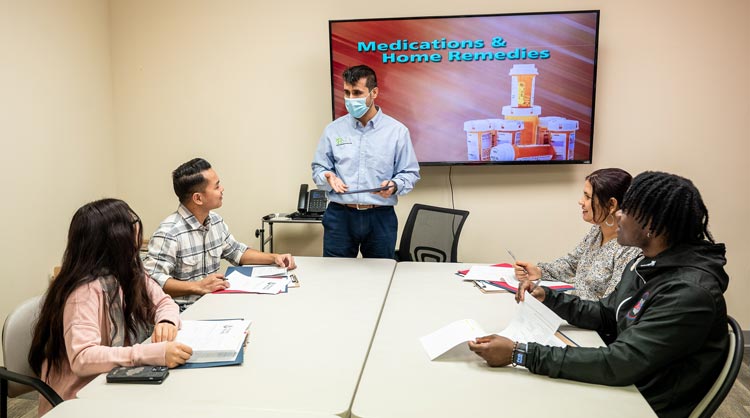Caring for Refugees
The patient is a loving husband who arrived in the United States as a refugee from Afghanistan with his wife and four children. Unexpectedly, the couple is now awaiting the birth of a fifth child. Weighing their social needs with their beliefs, they decide to carry through the pregnancy. With their growing family size, the only affordable housing option they can find to accommodate them is infested with lead. Now the children have rising serum lead levels. The man manages to find second-shift manual work. He has to get his two older children to school, learn English, learn a new job, take his four children to their doctor and other appointments, apply for food stamps and WIC, learn to drive, get his driver’s license and find a way to buy a car, get baby supplies, and clean up lead in his house while finding a new home. His wife only has time for two prenatal appointments because she has to watch the two younger children who are not yet in school. She ends up delivering the new baby by herself, alone, while her husband is at work. Now he has to figure out how to take care of his wife and five children, move to a new home, apply for the baby's birth certificate and benefits while still working 40+ hours a week… in a country that is still unfamiliar and not always welcoming.
Health care and self-care are the last things on his mind.

Sibley Strader, M.D. (’18), looks on as community organizer Lida Ahmadi and bilingual CMA Tara Bajgai practice a health screening. Photos: Andrea Hallgren.
This is not the plot of an Upton Sinclair novel where everything that can go wrong is piled onto one family to make a point about social injustice.
It is a case study shared by Sibley Strader, M.D., a bilingual staff physician at the International Community Health Center (ICHC) of Asian Services In Action (ASIA) in Akron, Ohio, and 2018 graduate of Northeast Ohio Medical University.
“My refugee patients face an insurmountable challenge with access to health care,” Dr. Strader said. “Like many underserved communities, they face obstacles including difficulty obtaining medicine, lack of transportation, confusion with the U.S. health care system, and prioritizing of basic needs over medical concerns. Adding to that, they have systemic barriers including the limited availability of specialists, limited expertise in refugee care, limited use of interpreters, anti-immigrant sentiment and limited refugee health insurance coverage [Refugee Medical Assistance coverage is limited to 8 months]. Adhering to appointments and medications is insuperable.”
ICHC is a Federally Qualified Health Center that delivers comprehensive, culturally and linguistically centered health care to community members, many of whom are refugees and immigrants with limited English proficiency and limited knowledge of health and social service systems in the U.S. While attending to their medical and mental health needs, the health center also connects patients with community services provided by ASIA and other organizations to ensure that their social service needs are also met.
The clinic provides refugee health screening for all of Summit County. The refugees – the majority of whom are ethnic Nepalese from Bhutan, as well as others from Afghanistan, Burma, Congo and recently Ukraine – are often referred to the clinic through the International Institute of Akron, the local resettlement agency.

Sibley Strader, M.D. (’18, center), with staff at ICHC.
The United Nations defines a refugee as someone who, “owing to a well-founded fear of being persecuted for reasons of race, religion, nationality, membership of a particular social group or political opinion, is outside the country of his nationality, and is unable to, or owing to such fear, is unwilling to avail himself of the protection of that country.”
“They may flee from armed conflicts, crises, violence, human rights violation such as torture; some may no longer feel safe and may have been targeted just because of who they are, what they do or what they believe,” Dr. Strader noted.
Step By Step
Often, the first person that new patients see when they arrive at ICHC is Hamayon Yaqobi, the senior operations manager and refugee health screening coordinator. Yaqobi worked for the U.S. military as a culture and language advisor in Afghanistan, before immigrating to the United States on a special immigration visa.
He helps new patients through the intake process and, in the case of refugees and other recent immigrants, makes sure their international medical records are in order and that any infectious diseases can be treated right away. “We facilitate appointments, transportation, follow-up appointments and referrals,” he said. He follows up step by step to ensure that patients understand the process and have the support they need.
Even with assistance, accessing care and services can be difficult due to language barriers and cultural differences.
“Basic health knowledge should not be implied,” noted ICHC nurse Annika Detweiler. “Many of our patients may not even know what 911 is and what happens if they call. Simple, uncomplicated explanations of health information is vital.”
Yaqobi helps fill those gaps in knowledge, leading sessions to help refugees and other new immigrants learn the basics. “How to make an appointment, how to call 911. If something goes wrong, what do they do? How can they get ahold of people [from the clinic] after 5 o’clock or in an emergency? We show them how to pick up their medication,” he explained.
Translation services help make sure that information is imparted in patients’ native languages. Yaqobi himself is fluent in English, Pashtu, Dari and Farsi, and is picking up Nepalese from working at the clinic. Many ASIA staff are trained in the Breaking Barriers in Healthcare medical interpretation training course to become qualified medical interpreters.
“Improper interpretation causes disparity and language access is essential,” Dr. Strader noted. “Over 90% of our staff are bilingual or multilingual. They are apt in working with interpreters and are diligent to make sure that interpreters are repeating only what the patients say, without adding, subtracting, summarizing or changing anything.”
Medical assistant Mon Gurung, a Nepalese refugee from Bhutan, came to the U.S. in 2012 and joined the ICHC staff in 2021. His own experiences in a refugee camp in Nepal helps him help others navigate the system. For instance, he explained that in camp clinics, payment is generally expected up front, before health services are provided. “You had to pay before getting care from the health care personnel or the doctor. And some people who came from that background or that place, they think here [at ICHC] they might have to pay, that it is costly or will become a burden in future.”
Cultural Humility
One of the challenges of working with refugees and any immigrant group is understanding cultural differences. Another is making sure that understanding does not lead to stereotyping. After all, just because some or even most members of a particular ethnic group or religion hold certain beliefs, that does not mean that all members of that ethnic group or religion share those beliefs.
“Traditionally, health care teams have been taught the assumption of cultural competence—that it is achievable by taking a class, seminar or in-service. There have been stereotypes and generalizations in which health care teams believe if one person from a specific group thinks a certain way, then all others will as well,” noted Dr. Strader. “However, there is no way to predict beliefs and behavior except from learning from the patients and their families. Cultural humility teaches me to honor my patients' stories around their needs and cultural desires and integrate their narrative with my medical knowledge, which enables me to form the individualized plans that will optimize my patients' health outcomes.”

Hamayon Yaqobi (standing) provides education on navigating the health care system.
One way to ensure cultural understanding and encourage the view of individuals as individuals and not solely as group members, is to ensure that staff are representative of the community being served.
“I think that one of the important responsibilities in terms of how we staff our services is that we make sure we are hiring people with an in-depth knowledge of the community that we serve,” said Elaine Tso, CEO of ASIA. “And oftentimes that means that we are hiring from the communities that we serve. So there is language accessibility and cultural understanding. In addition to that, we count on those who are from the communities to provide further education to those of us who are not from those communities.”
Cultural humility teaches me to honor my patients' stories around their needs and cultural desires and integrate their narrative with my medical knowledge
Tso noted trust is a vital component in developing that relationship.
“If the community that we're serving does not know us or trust us, they aren't necessarily going to share those insights. Or they will tell you something that they think you want to hear so that you'll go away,” she said. “That is why I promote something that I call relentless outreach. We cannot just drop in and drop out. That is not outreach. Outreach has to be relentless. And that means that we are everywhere. It means that we are at community events, at mainstream events, that we host events and that we give community members a feeling of security to be honest with us about whatever their needs are, whatever their challenges are, and that they allow us to help them.”
An Ounce of Prevention
Sometimes the differences in caring for refugee populations are not cultural or social. Sometimes they are medical.
“From a medical perspective, I generally anticipate a higher risk of tropical and infectious diseases [among refugee populations] such as tuberculosis, hepatitis A and B, HIV, malaria, parasitic infections and sexually transmitted infections; dental decay; trauma and torture; PTSD, mood disorders and somatization; micronutrient deficiencies, chronic pulmonary disease (fume inhalation) and missing immunizations,” Dr. Strader noted.
The list of maladies could be overwhelming, but Dr. Strader makes sure to remember that each patient is an individual, not a compilation of ailments.
“It is more important to me to focus on my patients' strength and resilience. Refugees are often defined by their displacements. Care providers think of their deficits—low English proficiencies, psychosocial needs, physical and mental health risks—and lose sight of their unique strengths and cultural assets,” she said. “They have overcome unimaginable adversity. They can speak another language. They have strong ties to their family, communities and tradition. By appreciating what they have, what they know and what is important to them, I am able to build a strong physician and patient relationship with my patients.”
Their prosecutors may have the power to evict them from their homeland and take away their citizenship and properties, but it cannot take away their pride, knowledge, culture and history.
When filling its appointment schedule, the clinic takes into consideration the need for extra time for consultation. Sometimes, that extra time is spent explaining the difference between primary care and specialty care, a distinction that does not exist in some cultures.
Tso noted, “The notion of preventive medicine is a new notion for the international community. So what we face sometimes is what the clinical people call ‘noncompliance.’ Things like missed appointments, nonadherence to medication. Because sometimes community members, when they feel okay, if they don't have a headache from their high blood pressure, then they think that they don't need to take their medication. It's a two-way gap in the sense that on the one hand, the refugees don't understand preventive medicine. And the physicians, they need to do a better job of explaining this notion.”
Testimonies of Strength
“My refugee patients are the testimonies of hope, love, strength and unwavering determination,” said Dr. Strader. “Their prosecutors may have the power to evict them from their homeland and take away their citizenship and properties, but it cannot take away their pride, knowledge, culture and history. Whatever time, energy and resources they have, they use it to support their family and community. They seldom lament their loss and their past. They adapt and thrive, bringing vibrancy and economy to the area.
“I am honored and truly grateful to get to know them, celebrate their experiences and cultural assets, and support their well-being and their endeavor to create a new life in our region,” she said.


